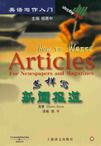怎样写新闻报道
出版时间:2005-1 出版社:上海译文出版社 作者:(美)索娃(Sova,D.) 页数:113 译者:周平
Tag标签:无
内容概要
现在,报刊类的英语文章已成为中国英语学习者学习英语的主要渠道之一。这对有志于高考或考研或考博的学习者而言,有着不言而喻的重要意义。因此,了解有关报刊类英语文章的各种特点,不仅能帮助英语学习者们熟悉和了解最新英语词汇和当代各种热门话题,还可以在整体上提高英语学习者的英语水平和能力。 全书共分十章:确定写作题材,收集相关信息,如何写引言,写作基础,句子与段落的写作,转换词语的使用,措辞、细节的描写的作用,引语的作用,结尾的写作和定稿。作者在全书中所使用的方法主要是举例法和定义法。定义法主要被用来对一些基本概念下定义,举例法主要被用来说明或解释作者的观点或建议。
书籍目录
全书导读本章导读第一章:寻找题材 Generating Ideas Focusing On The Subject The Query Letter本章导读第二章:收集信息 Fact Versus Opinion Observation Interviews Background Reseatch On-Site Records Research本章导读第三章:撰写引言 The Hard News Lead The Soft News of Feature Lead本章导读第四章:写作基础:句子与段落 Writing Effective Sentences Organizing Paragraphs Exploiting The Potential Of Grammar本章导读第五章:转换词语 The Building Block Approach The Jigsaw Puzzle Approach The Chronological Approach The Spatial Approach he Quotation Approach本章导读第六章:措辞 Vibrant Verbs Precise Diction Active Rather Than Passive Voice Usage Bias-Free Language本章导读第七章:细节描写:激发读者的想象力 Becoming A Trained Observer Using Description In The Hard News Article Using Description In The Feature Article本章导读第八章:引语的使用 Why Use Quotations? Choosing Effective Quotations Integrating Quotations Into Text Attributing Quotations 本章导读第九章:结尾方式 Ending The Hard News Article Ending The Feature Article Factual Ending本章导读第十章:定稿 Glossary
章节摘录
Opinions. Interpretations in hard news stories should be left to the readers, not expressed by the writer. When opinions are included, they should be clearly labeled as such, and the source of the opinion should be identified. Feature stories usually call for opinions, but the same care must be taken to play fair with the reader. Opinions consist of personal viewpoints, so they cannot be proved or disproved. However, the extent to wluch an opinion is valid can be assessed in several ways: By determining the reliability of the person offering the opinion By examining the data on which the opinion is based By ascertaining the authority of the person expressing the opinion Opinions can be hard to assess, so the careful writer always identifies the source within the article. A. Dr. Everyman, dean of students, views students in the 1990s as better prepared for college than those of earlier decades. B.The attending physician characterized the fugitive as extremely attractive to women. C.The quality of education in Everytown is very low. Such opinions can add reader interest, but the source may need to be explained further. 1. Statement A seems to be a reasonably expressed opinion, given the position of the speaker. The problem lies in his ability to express a valid opinion that relates to earlier decades. Has he held a similar position or the same position during the earlier decades? If so, then no one will question his ability to comment on earlier decades. If, however, Dr. Everyman has recently become a dean of students and has worked in student personnel administration only in the 1990s, he has no experience on which to base his comparison. If you must use his opinion and cannot find a more experienced individual, clearly indicate in the article that he is expressing an opinion based on hearsayor research. 2. Statement B may be a valid opinion if the attending physician has observed the fugitive interacting with women or if the attending physician is a woman. If either case applies, the writer should include that information. If neither case applies, then further explanation is needed to support the validity of the opinion. What qualifies the "attending physician" to come to such a conclusion? How valid is such a conclusion? 3. Statement C appears to be the opinion of the writer, because no attribution is given and no appeal is made to authority, to statistics, or to a reliable source. A statement of this type leaves a writer open to extensive criticism and requires more information to support the assertion. To place so generalized a statement in an article is more than careless; it is irresponsible. The ability to discern the difference between fact and opinion is important in information gathering. You will save time by starting out smart, thus reducing the amount of checking and rechecking required and ensuring that articles are accurate and well-supported. OB SERVATION Observation skills are important in writing both hard news and feature stories. You must leave personal opinion out of hard news stories, but the inclusion of descriptive details based on your observations is vital in bringing a story to life and providing readers with a sense of immediacy. The benefit of a writer's obsefvations is that it eliminates the need to rely on possible inaccuracies in the reports of others regarding an occurrence. At the same time, a greater burden is placed on you to re-create the scene and the players. ……
图书封面
图书标签Tags
无
评论、评分、阅读与下载
用户评论 (总计7条)
- 纸张一般,书比较薄,做个参照吧。应该会有所帮助的
- 要学英语报道一定要从业,或者直接去英语新闻网站去评议。看书没多大用处。不过如果要了解英语新闻物要素,读读这本书就很有用,而且书很薄,翻一遍也很有益。
- 怎样写新闻报道
- 很简短地一套小册子
- 还不错的,就是自己想要的
- 英语写作入门:怎样写新闻报道
- 经济实惠,内容充实,物有所值!
相关图书
- 新编大学英语(2)视听说教程(教师用书)磁带10盘
- 新编大学英语(2)视听说教程(磁带5盘)
- 生命的和谐
- 高中英语(第四册)学生用书(供高中一年级下学期使用)(新标准)必修4
- 新编大学英语视听说教程
- 趣趣英语
- 认知语言学与隐喻研究
- 怎样写短篇小说
- 怎样写出学术论文
- 英语(第四册)磁带3盘(领读带)(供三年级起始用)(新标准)新版
- HAPPY阅读丛书·高3英语(上)
- 社会万象新闻透视
- 基督教与西方文化
- 公务员普通话培训与测试
- 美国之音特别英语听力
- 福尔摩斯探案
- 福尔摩斯探案
- 福尔摩斯探案
- HAPPY阅读丛书:初1英语(下) (平装)
- 精英荟萃经济纵横
- 高二英语(上)
- 高一英语(下)
- 初三英语(下)
- 初中英语分类阅读
- 银色马硬纸盒子
